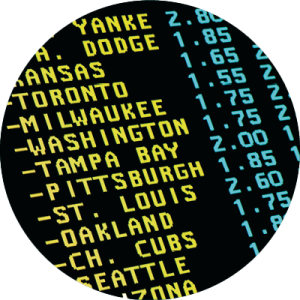While some may consider gambling an occasional recreational activity, it can be much more complicated and detrimental for others.
Whether you are experiencing symptoms of problem gambling or are concerned about someone you care about, being aware of the different forms can help you understand the related risks and patterns.
Sports betting, casinos, lottery tickets, pull-tabs and bar gambling are all common forms of gambling, and often presented as fun, exciting social activities. Learn about the realities of each below.




Sports Betting
This type of gambling can be done at sporting events, on an app, or online, allowing participants to predict the outcome of a game and wager money based on their guess. Wagers can be placed on specific plays and scores, as well as on an overall win or loss — all of which are impossible to know ahead of time, which makes this type of gambling risky.
With online access, sports betting has grown in popularity in recent years. Since it can be done from a smartphone or tablet 24/7, it can be easy to hide, and has potential to quickly become a financial burden or escalate into serious problem gambling.
Signs to watch out for include continuing to place sports bets after losing or betting frequently and consistently rather than for occasional fun.
Casinos
Casinos are brick-and-mortar businesses designed for gambling, with a variety of types including video slots and poker as well as card games. The fact is, casinos are designed to make money, and are profitable because most gamblers lose. This means those placing bets are typically paying a financial price.
For games like slots, payouts are statistically calculated and casinos have the advantage, meaning when gamblers enter a casino, the odds are already stacked against them – they’re mathematically “unlucky”, with a good chance of leaving their money on the gaming floor.
Visiting a casino frequently, during the week, or simply more often than you intended, can suggest a possible gambling problem. If you’re not sure whether you should be concerned, confiding in a trusted friend or seeking confidential, professional help can be a great first step in finding out if you need help and support.
Lottery Tickets
Often purchased at gas stations and grocery stores, lottery tickets are a form of gambling that is entirely left up to chance, making it nearly impossible to win.
Winning tickets are selected from a large pool with such slim odds of winning that it typically leads to lost money. It’s no surprise that
purchasing them frequently, or in large quantities, can lead to financial problems. Purchasing a ticket and instantly finding out whether you’ve
won something can be a thrilling feeling, but it can cause some people to develop a habit even with such an incredibly small chance of winning.
While this might seem like a fun activity, buying lottery tickets can impact your budget and financial goals over time. Setting the money that
may have been spent on lottery tickets aside for savings can help you reach your goals without the risk and high likelihood of lost money.
Pull-Tabs and Bar Gambling
This type of gambling is typically a colorful piece of paper, with strips that can be peeled back to reveal whether a participant won or lost money. Pull-tabs are very popular as a means of raising dollars for charity, and unlike slot machines, played against other players, there are a predetermined number of winners.
Bar gambling can also be enticing, with bright, colorful symbols and an interactive aspect that makes it appear fun and harmless, sometimes looking like a video game. But with very slim chances of winning for both pull-tabs and bar gambling, they’re both easy ways to lose money.
Pull-tabs offer instant results, which can make it tempting to purchase more after winning or losing. Bar gambling is also set up to encourage
continued play. If you’ve experienced the urge to keep gambling or find yourself unable to step away, it can be a sign of problem gambling.
Asking a close friend or family member to help with accountability or getting professional help can make a positive difference and be the first
step toward having more control over your life.

